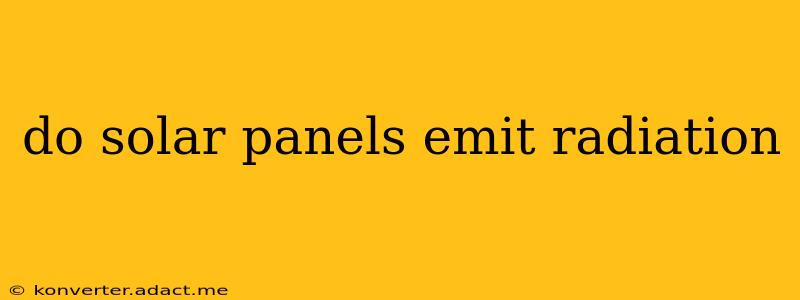Do Solar Panels Emit Radiation? Understanding the Facts
The question of whether solar panels emit radiation is a common one, often fueled by a misunderstanding of the types of radiation involved. The short answer is: yes, but not the kind you need to worry about. Solar panels do emit radiation, but it's a type of electromagnetic radiation that's entirely harmless to humans. Let's delve deeper into the specifics.
What Kind of Radiation Do Solar Panels Emit?
Solar panels generate electricity through the photovoltaic effect, converting sunlight into direct current (DC) electricity. This process involves the emission of low-level electromagnetic radiation, specifically in the infrared (IR) and radio frequency (RF) spectrums.
-
Infrared (IR) radiation: This is the same type of radiation that's emitted by any warm object, including your own body. The amount of IR radiation emitted by solar panels is negligible and poses no health risk. Think of it like the slight warmth you feel from a sunny window – that's infrared radiation.
-
Radio frequency (RF) radiation: This is a type of non-ionizing radiation that's also emitted at very low levels. RF radiation is used in many everyday technologies, including cell phones and Wi-Fi routers. The amount of RF radiation emitted by solar panels is far lower than these devices.
It's crucial to differentiate this low-level non-ionizing radiation from ionizing radiation, such as X-rays or gamma rays. Ionizing radiation has enough energy to damage cells and DNA, posing potential health risks. Solar panels do not emit ionizing radiation.
Are Solar Panels Safe?
The scientific consensus overwhelmingly confirms that the electromagnetic radiation emitted by solar panels is not harmful to human health. Numerous studies and reports from reputable organizations like the World Health Organization (WHO) support this conclusion. The levels of radiation are far too low to cause any adverse effects.
What About the Materials Used in Solar Panels?
While the operational radiation emitted by solar panels is harmless, it's important to mention the materials themselves. Solar panels contain some materials that could potentially be harmful if mishandled or improperly disposed of. However, these risks are associated with the manufacturing and disposal processes, not the daily operation of the panels. Responsible recycling programs are crucial to mitigate these potential environmental concerns.
Do Solar Panels Emit Harmful UV Radiation?
No, solar panels do not emit ultraviolet (UV) radiation. In fact, they absorb UV radiation, which is a crucial part of how they generate electricity. The solar cells themselves are designed to capture the energy from UV light, alongside visible and near-infrared light, and convert it into electricity. This further underscores the safety of solar panels in relation to radiation.
How Do Solar Panels Compare to Other Technologies?
When compared to other energy sources, solar panels are exceptionally safe regarding radiation emission. Fossil fuel power plants, for instance, release significant amounts of air pollution and greenhouse gases, which pose far greater risks to human health and the environment than the minimal radiation emitted by solar panels.
In conclusion, while solar panels do emit a small amount of electromagnetic radiation, it's a non-ionizing type entirely harmless to humans. The benefits of solar energy, both environmentally and in terms of health safety, far outweigh any theoretical radiation concerns.
